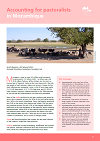Accounting for pastoralists in Mozambique
Agropastoralism is the main form of livestock production in Mozambique. It is concentrated in the drier, central and southern provinces, away from tsetse-infested areas. While chickens and goats are more numerous, cattle are the most important type of livestock. They are a source of income and draught power, a store of wealth and important culturally. Livestock are a vital source of income for large numbers of farmers, especially in the south of the country. Agropastoralism and food security could be improved through better veterinary services, improved feeding and watering in the dry season, and breeding based on local breeds. Agropastoralism is not officially recognized as a form of management, and it does not figure prominently in government policies. Better, more frequent and more detailed data will be needed if Mozambique is to take advantage of the opportunities presented by livestock for its agricultural development. Also available in Portuguese.

